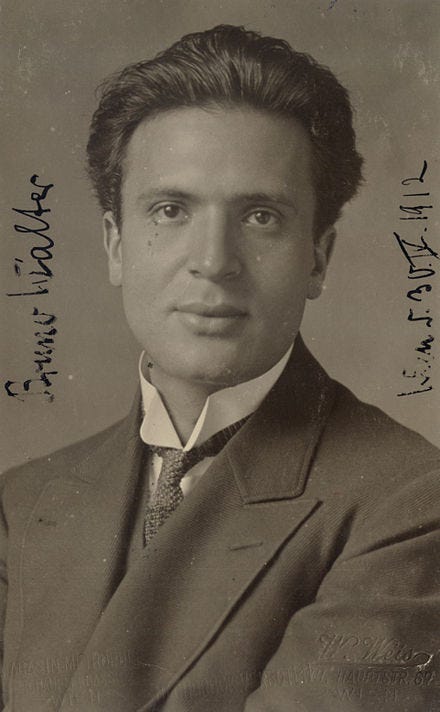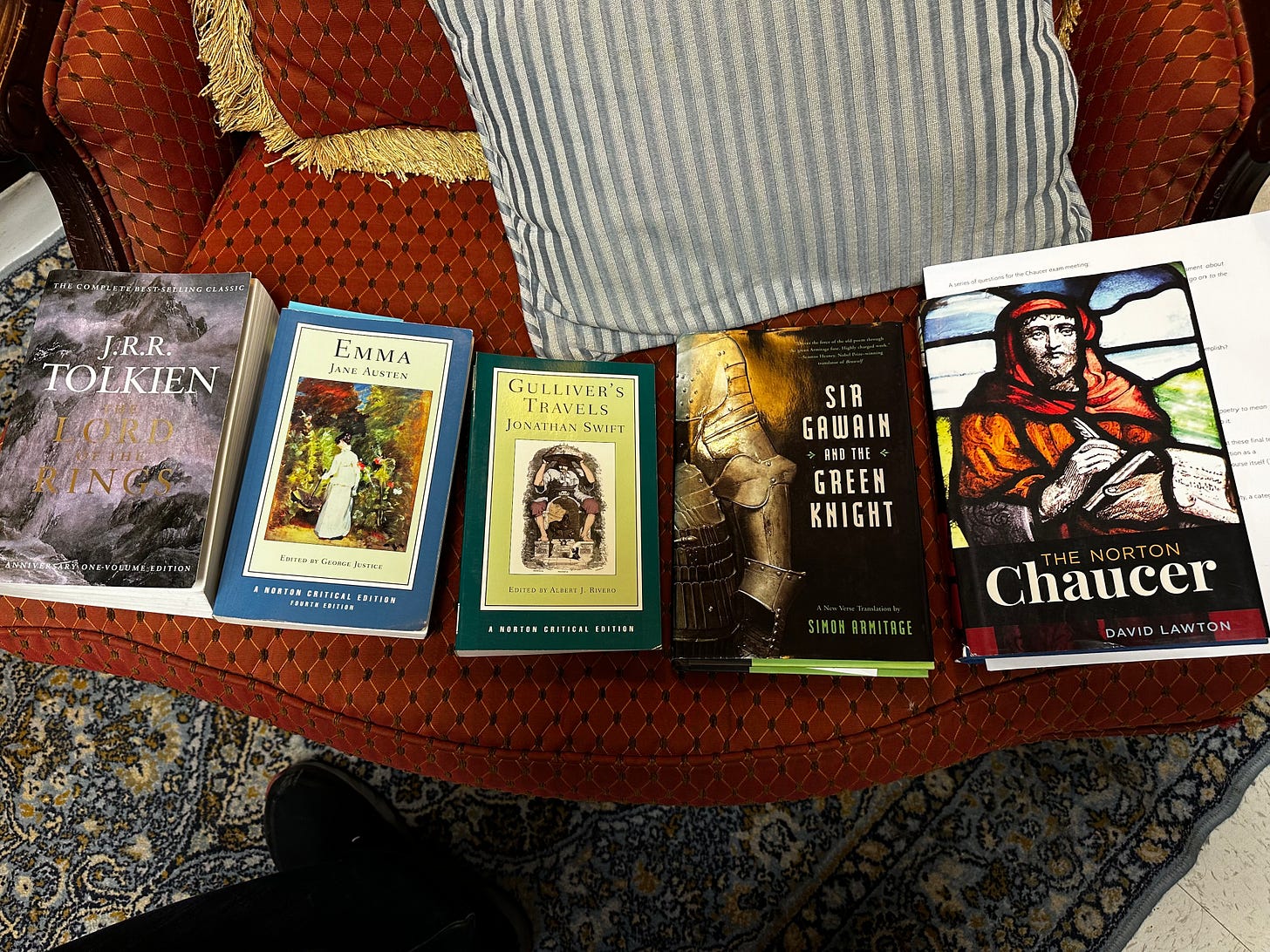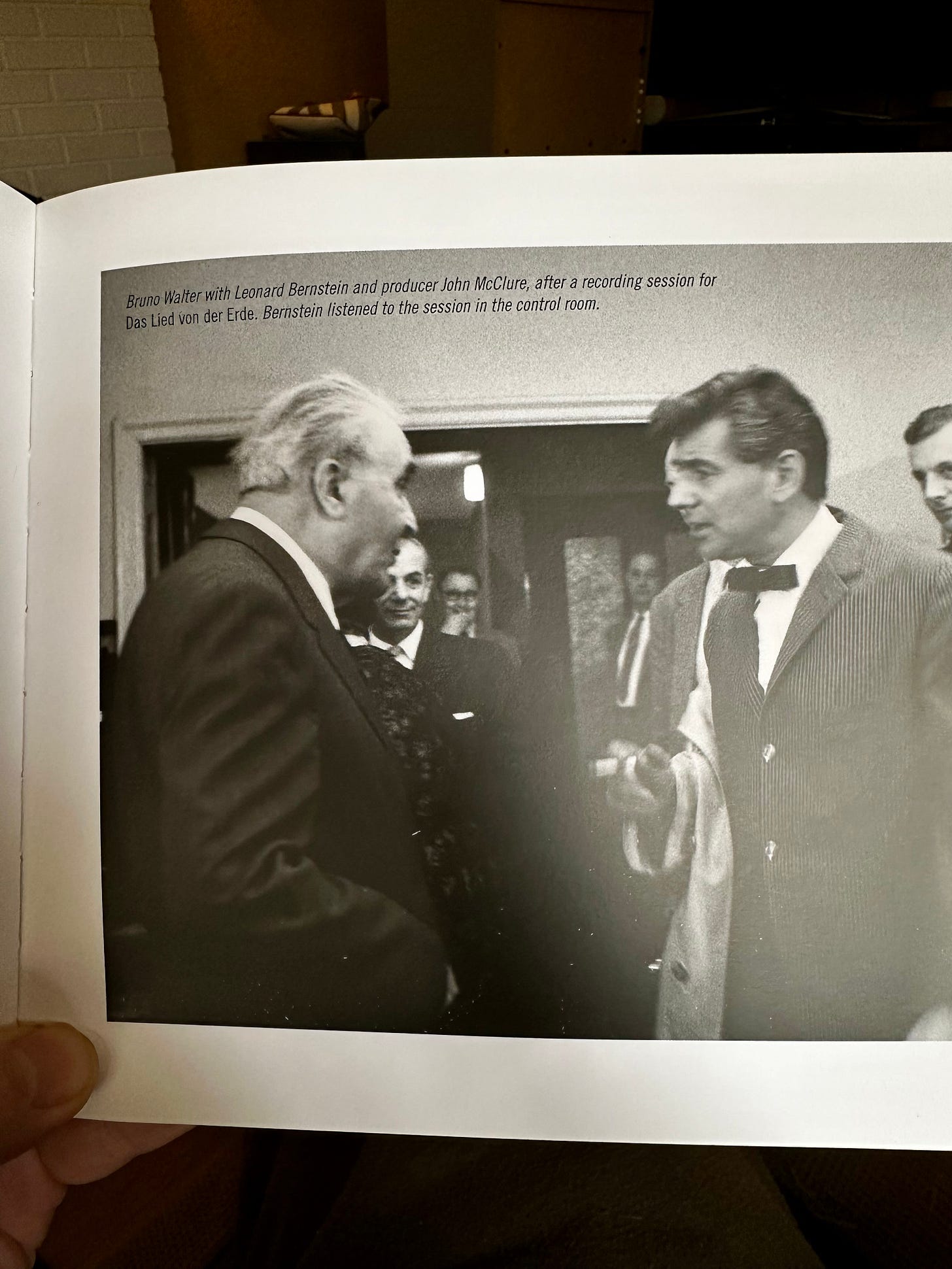J.R.R. Tolkien, Jane Austen, and Bruno Walter Walk into a Bar
Bird-Bolts and Cannon-Bullets, No. 25

Dear reader,
I’m sure that the above title would make for a good joke, but my comic muse is napping. Feel free to compose the joke in the comments.
Since we will be finishing up our Beowulf Challenge soon, it’s a good time to look forward to our forthcoming projects for the year ahead. I’ll pin this post for your reference through the year. The first three of these challenges (Beowulf, The Lord of the Rings, Emma) I announced on New Year’s Eve, but I’m announcing three more today for 2024 and beyond, and I am very excited about them. I hope that you will be too. Also today, we have our first Meet the Artist playlist, and leading off the batting order is one of the great conductors of the twentieth century, Bruno Walter.
Reading Challenges in 2024 and Beyond
The Beowulf Challenge (finishing February 7th, 2024): We are going to add one more week to the challenge beyond week four as a kind of epilogue and as a chance to discuss Tolkien’s essay on the poem, “Beowulf: The Monsters and the Critics,” which will lead nicely into the Tolkien project in March. For those of you who may be joining late, never fear: the challenge will remain in the archive, so you have plenty of time to catch up.
The Lord of the Rings Challenge (nine weeks, March 13th through May 8th, 2024): This will not be a fan-boy hagiography of Tolkien. Yes, we love this book, but we will be reading it closely, tracing Tolkien’s medieval influences, his ecological perspective, and his fascination (obsession?) with language. We also will consider what some of the women featured in our “Clapping Back to Misogyny” series might have to say about this very male book. Starting with this challenge, there will be a bonus post each week for paid subscribers containing the “challenge” material, but the main essay each week will still be available to everyone.
The Emma Challenge (six weeks, June 12th-July 17th, 2024): Speaking of women featured in our “Clapping Back to Misogyny” series, one of them happened to have written (in my opinion) one of the two best novels in the English language. And we will spend six glorious weeks this summer reading and discussing it.
The Swiftian Challenge (eight weeks, August 28th-October 16th, 2024): This fall we will turn our attention to the second most famous Swift in the world. We will read Gulliver’s Travels, along with some of his shorter works.
The Sir Gawain and the Green Knight Challenge (four weeks, November 13th-December 4th, 2024): If you loved Beowulf, you will love SGGK. Actually, the two poems are completely different in tone and perspective, but you’ll love it anyway.
And coming in early 2025:
The Chaucerian Challenge: Chaucer’s Major works, including selected Canterbury Tales, Troilus and Criseyde, and the Dream Visions. Time to brush up on your Middle English!
Listening Challenges:
In between these reading challenges, starting February 16th, we will begin our listening challenges, which will feature a playlist of different interpretations of a classic piece of music each week.
Meet the Artist Playlist: Bruno Walter
The man Leonard Bernstein was subbing for when he made his debut as conductor of the New York Philharmonic on that fateful night in 1944 was a legend in his own right. When Bruno Walter’s career as a musician began, Brahms was still alive. Walter would go on to become Mahler’s assistant and would conduct the first performance of his mentor’s Ninth Symphony in 1912 with the Vienna Philharmonic. As a Jew in Germany in 1933, he could see what was coming, and he immigrated to France and then to the United States, where he became the conductor of the New York Philharmonic.
And here is the miracle: a man whose career spanned back to the age of Brahms and Mahler would end up living long enough to make stereo recordings for Columbia Records. And what a recorded legacy it is. He stuck primarily to the core German repertoire, so you won’t find the variety that we see, for example, in Bernstein’s discography. But he knew that music as well as anyone ever has, and he made reference recordings of much of it. For the playlist I have chosen only later, stereo recordings with the Columbia Symphony Orchestra, simply because of the sound quality. Most casual listeners tend not to enjoy scratchy mono recordings; however, Walter made plenty of great recordings in the mono era, so there is plenty for you to explore on your own if you are interested. That said, Walter was still at the top of his game late in his life, and so we get the best of both worlds with the stereo recordings—great sound and great musicianship. I think that you will love this playlist. It’s full of great tunes and vibrant performances. Here are the included recordings, with links to the playlist on different platforms at the end:

Mahler: Symphony No. 1 in D Major “Titan,” with the Columbia Symphony Orchestra, 1961
It’s hard to believe, but Mahler was not a household name in the early 1960s, when Walter recorded this. Having been Mahler’s assistant, he was a persistent champion of his work (though he did not record a complete symphony cycle). It was largely the advocacy for Mahler by Walter, Rafael Kubelik, and, especially, Leonard Bernstein that established the composer as canonical and a staple of the repertoire. This recording of the “Titan” symphony remains one of the very finest.
Beethoven: Symphony No. 7 in A Major, with the Columbia Symphony Orchestra, 1958
It’s Walter conducing Beethoven. What more do you need?
Mozart: Violin Concerto No. 3, with Zino Francescatti and the Columbia Symphony Orchestra, 1958
Walter was one of the great orchestral accompanists, and the French violinist Zino Francescatti was one of his regular collaborators.
Schumann: Piano Concerto, with Eugene Istomin and the Columbia Symphony Orchestra, 1961
Here Walter collaborates with American pianist Eugene Istomin. You rarely see this included in lists of standard recordings of this concerto, but I don’t understand why. (For some reason, this recording does not seem to be on Spotify, or at least I couldn’t find it.)
Brahms: Symphony No. 1 in C Minor, with the Columbia Symphony Orchestra, 1959
If I had to choose one complete recorded cycle of Brahms symphonies to take to a desert island, it would be Walter’s. (He actually recorded two complete cycles, including an earlier one in mono with the New York Phil.) All four performances are exciting and heart-wrenching in all the right places. If you are a Brahms skeptic (and you know who you are), give this one a try. It may convert you.
Haydn: Symphony No. 100 in G Major “Military,” with the Columbia Symphony Orchestra, 1961
Classic, big-band Haydn.
Schubert: Symphony No. 8 in B Minor “Unfinished” and Symphony No. 9 in C Major “Great,” with the Columbia Symphony Orchestra, 1958
The Schubert C-Major symphony is the only piece to appear on the PCF playlists with both Walter and Bernstein, and they are both fabulous performances. You might try listening to both in order to compare them. Do you have a preference?
Brahms: Alto Rhapsody, with Mildred Miller, the Occidental College Concert Choir, and the Columbia Symphony Orchestra, 1961
Brahms wrote this as a wedding gift for Robert and Clara Schumann’s daughter. What a nice gift!
Mahler: Symphony No. 9 in D Major, with the Columbia Symphony Orchestra, 1961
Mahler died in 1911 at the age of 50, leaving a completed Symphony no. 9 and an unfinished Symphony no. 10. Alma Mahler, the composer’s widow, asked Bruno Walter to conduct the premiere of the Ninth with the Vienna Philharmonic. He made this stereo recording almost fifty years later. It’s a mystical performance.
Here is an interview with Walter, in which he speaks beautifully about working with Mahler:
Links:
Link to the Bruno Walter Playlist on Apple Music
Link to the Bruno Walter Playlist on Spotify
Link to the Bruno Walter Playlist on YouTube
NB: the running order differs slightly on the Spotify playlist. Also, I was not able to find the Schumann recording on Spotify.
There are no changes to the Rotation this week, but by next week I hope to have it up on YouTube as well as Apple Music and Spotify.
Thanks for reading, from my fancy internet typewriter to yours.








I just realized that I was mistaken: the Schubert is *not* the only piece to appear on both the Bernstein and the Walter lists. There are also recordings of Beethoven No. 7 on both. Sorry about the oversight. If you want an alternative, try Walter’s recording of Beethoven’s Pastoral Symphony, which is also a reference recording.
Wonderful, I've been hoping someone would do a Chaucer read! I'll be here for Emma, too - my favorite Austen novel.
Just out of curiosity, if Emma is one of the two greatest novels in the English language, what is the other?